Featured Speakers
2025 Plenary Addresses
As the program evolves, we will have more news to share, check back often for updates

Dr. Anita Gupta
CPA President 2024-25
Presidential Address
Title: For the Love of Learning: Fostering Growth and Compassion in the Face of Challenge
Valuing achievement over learning and growth can add to the burden of navigating already challenging environments. Drawing from experience working with high achieving individuals in demanding environments such as health care professionals, post graduate trainees, elite athletes, and those living with chronic illness, this talk will explore the impact of unrealistic expectations, perfectionistic anxiety, and imposterism, which can often be validated by the cultures of educational, employment and medical systems. Additionally, it will discuss ways to better lean into learning and growth with compassion.
Dr. Anita Gupta is a clinical, health, and rehabilitation psychologist registered in Nova Scotia and Ontario. She currently works in hospital-based psycho-oncology in Halifax and also has a private practice. She has worked in various medical and higher educational settings. She has extensive experience clinically with individuals coping with the demands of medical conditions, as well as those working and training in high demand settings (e.g. health care providers, post graduate trainees, athletes). She is a proud long-term member of the Canadian Psychological Association (CPA). She joined CPA's Board as a Director-at-Large in 2022 and is honoured to be the current President.
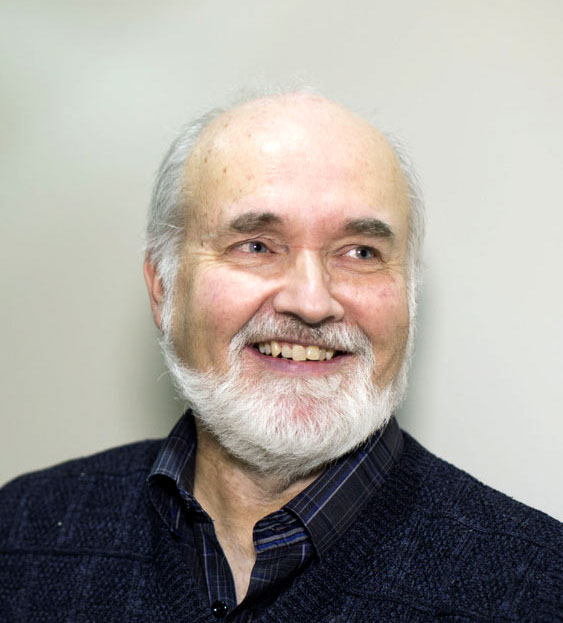
Dr Gord Flett
Honourary Presidential Address
Title: The Healing Power and Potential of Mattering
While the importance of having self-esteem is widely recognized, until recently, another key element of the self has been neglected—a sense of mattering to other people. It is argued in the current address that mattering is a unique and powerful psychological construct with great potential to improve the lives of people of various ages. The need to matter is a universal need and the feeling of being important and significant to others is central to subjective well-being. Mattering is discussed as double-edged in that mattering is highly protective as a source of growth and healing but the feeling of not mattering (i.e., anti-mattering) and the fear of not mattering are deleterious, especially among people who have been marginalized and mistreated. Evidence is summarized indicating that deficits in mattering are linked with key consequential outcomes at the individual level (i.e., depression, loneliness, social media addiction), relationship level, and societal level (i.e., delinquency, violence). The discussion concludes by considering mattering as a core source of strength or vulnerability in the lives of individuals and a vital component of the client-therapist relationship.
Gordon L. Flett, Ph.D., is a Professor Emeritus in the Department of Psychology at York University in Toronto, Canada, where he held a Tier 1 Canada Research Chair in Personality & Health for over two decades. He is also the former Associate Dean of Research and former Director of the LaMarsh Centre for Child and Youth Research in the Faculty of Health at York University. Currently, Dr. Flett is an Associate Editor of Canadian Psychology.
Dr. Flett is recognized globally for his seminal contributions to research and theory on the role of perfectionism in mental and physical health, and more recently, his contributions to the study and understanding of individual differences in mattering to others. Dr. Flett has published over 400 journal articles and chapters, as well as 14 books, including books in 2018 on the psychology of mattering and in 2022 on perfectionism in children and adolescents, and most recently, in 2025 on the need to matter among children and adolescents.
Dr. Flett is a member of the Canadian Psychological Association and a Fellow of the Association for Psychological Science, which has cited him earlier in his career as one of the top 25 most productive authors in psychology. Dr. Flett is also the co-creator of numerous self-report measures assessing perfectionism (e.g., the Multidimensional Perfectionism Scale, the Child-Adolescent Perfectionism Scale), and mattering (e.g., Anti-Mattering Scale).
Dr. Flett has also served as a guest editor of multiple special issues on perfectionism and a recent special issue in 2022 on mattering. These special issues have appeared in the Journal of Rational-Emotive and Cognitive-Behavior Therapy, the Journal of Psychoeducational Assessment, and Psychology in the Schools.
Dr. Flett is extensively engaged in knowledge translation and exchange. His work has received widespread attention and has been the subject of numerous media stories, including coverage on CTV, CNN, and the BBC and in Maclean’s, the Globe and Mail, Scientific American, the Atlantic, the New York Times and the Washington Post. His engagement includes several podcast appearances and appearances on CBC Radio and National Public Radio.
Finally, reflecting his commitment to community issues. Dr. Flett has received the Community and Leadership Award, Toastmasters International, District 60. He has also received the City of Mississauga Certificate of Recognition for “Outstanding Commitment to the Community” and the Peel District School Board Award of Excellence for Community Service.

Dr. Esther Greenglass
Professor of psychology at York University in Canada.
Plenary Keynote Address, June 13th, 2025
Title: The Art of Coping
Effective coping with stress is essential to life satisfaction and quality of life. Yet, coping is not taught so we are left on our own to learn what works and what doesn’t work when we encounter stressful situations. At the same time, the study of coping has presented a formidable challenge to psychology. In general, coping has been regarded as reactive, a strategy to be used once a stressor has been experienced. Often when encountering stressors, the coping strategies people use are focused on regulating their emotional reactions to a stressor rather than focusing on the stressor itself. This may be because many stressors people encounter are diffuse and uncontrollable. An alternative way of conceptualizing coping has been put forward, namely proactive coping, that is something one can do before stress occurs. Proactive coping incorporates planning and building resistance factors to ward off future crises. It involves goal setting, having efficacious beliefs, and it is associated with resources, including social support, for self improvement. Since it is associated with self-efficacy and vigor, demands are perceived as a challenge rather than a threat. Proactive coping predicts positive outcomes important to the promotion of health and well-being. It incorporates a confirmatory and positive approach to dealing with stressors and is often associated with life satisfaction and well-being. In this talk, research will be presented that illustrates the relationship between proactive coping, positive affect and outcomes. Theoretically, through a social cognitive perspective, the study of coping is broadened to include self-efficacy principles, planning, and utilization of social support in the prediction of outcomes.
Esther Greenglass is professor of psychology at York University in Canada. She has published widely in the areas of positive psychology, health psychology, women, gender roles, work-family conflict, coping, burnout, and stress. Her recent research has focused on the psychological study of the effects of the Great Recession (2007-8), psychological consequences of COVID-19, as well as psychological factors and watching the Russian-Ukraine war. She is a Fellow of the Canadian Psychological Association (CPA), the American Psychological Association (APA), and the International Association of Applied Psychology (IAAP). She is past president of the Division of Health Psychology of the International Association of Applied Psychology (IAAP) and she is the Canadian representative to STAR, the Stress, Trauma, Anxiety, and Resilience Society. Her over 200 scholarly works include books, invited encyclopedic and book chapters, as well as articles in refereed scientific journals. She is widely cited for her work on stress and coping. She has given keynotes and invited talks in over 19 countries. She has co-authored The Proactive Coping Inventory (PCI), which has been translated into more than 21 languages and is being used internationally to assess coping both in the lab as well as in real life stressful situations.

Dr. Catherine Connelly
Professor and Business Research Chair of organizational behaviour at the DeGroote School of Business at McMaster University
Plenary Keynote Address, June 14th, 2025
Title: Beyond Uber Drivers: Understanding the Experiences of Contingent Workers In Canada
Many organizational theories and public policies are predicated on outdated ideas about what constitutes “normal” work: 9 to 5 days, 40-hour work weeks, and lifetime employment for a single company. With the rising popularity of Uber and the “gig economy”, there is an increasing understanding of the wide variation in work, workers, and workplaces. However, there is more to contingent and temporary work than Uber. Professor Catherine Connelly’s presentation will examine the experiences of a wide variety of contingent workers in Canada: temporary foreign workers, musicians, and medical residents. She will examine how these workers are mistreated as well as why this mistreatment endures.
Dr. Catherine Connelly is a professor and Business Research Chair of organizational behaviour at the DeGroote School of Business at McMaster University. Her research focuses on the attitudes, behaviours, and experiences of workers with non-traditional work arrangements (e.g., temporary foreign workers, gig workers) the effects of leadership styles on leader well-being, the experiences of workers with disabilities, and knowledge hiding in organizations. She is the author of Enduring Work and her other research has been published in the Journal of Applied Psychology, the Journal of Management, the Journal of Organizational Behavior, the Journal of Management Information Systems, Academy of Management Discoveries, the Journal of Vocational Behavior, Human Resource Management, Human Resource Management Review, and several other journals and books. She is a former associate editor for Human Relations and currently serves on the board of that journal as well as on the boards of the Academy of Management Discoveries, European Management Journal, Human Resource Management, Human Resource Management Review, and the Journal of Organizational Behavior.
Read more about Dr. Connelly and Connelly Research lab here: https://connellyresearch.com/

Elder Lorinda White & Elder Joan Hodder
Knowledge Keepers/ Opening Ceremony – Thursday, June 12, 8:30am
TBA
Best Practices in Vascular Cognitive Impairment (VCI): Implications for the Role of Psychologists
 Dr. Sherri Carter, Nova Scotia Rehabilitation Centre, QEII Health Sciences Centre
Dr. Sherri Carter, Nova Scotia Rehabilitation Centre, QEII Health Sciences CentreSection Featured Speaker Address
June 14, 2025
Section on Aging & Geropsychology
Background/rationale: VCI refers to cognitive problems that are caused by the effects of vascular disease on brain function, which can range from mild cognitive impairment to vascular dementia (Skrobot et al., 2018). The prevalence of risk factors for VCI, such as hypertension, cardiovascular disease, and diabetes, is high in Canada, and expected to worsen with an aging population (Leung et al., 2019). Symptoms of depression are associated with VCI in those with a history of vascular events, such as lacunar stroke (Ohlmeier et al., 2023).
Methods: A review of best practices for the assessment, diagnosis, and treatment of VCI will be presented, including the most recent Canadian Stroke Best Practice guidelines. Implications for the role of psychologists will be examined.
Results/Conclusions: Current best practice guidelines address screening, assessment, and management of cognitive dysfunction in VCI, screening, assessment, and treatment for VCI-related mood disturbances, and psychoeducation and support for caregivers. Psychologists working with older adults should be aware of and incorporate these recommendations into their practice.
Action/Impact: From contributing to assessment and diagnosis of VCI, lifestyle modification, and treatment of VCI-related mood disturbances, psychologists can play a key role in managing this important determinant of health in an aging population.
Sherri L. Carter, Ph.D. is a psychologist with a practice in clinical neuropsychology and over 20 years of experience in the area of stroke rehabilitation. She divides her time between the Nova Scotia Rehabilitation Centre, Nova Scotia Health and private practice. In addition to her clinical practice, she is the Professional Practice Coordinator for the QEII Psychology discipline in the Nova Scotia Health Rehabilitation and Supportive Care portfolio. She holds an Adjunct (Clinical Associate) appointment with the Dalhousie University Department of Psychology and Neuroscience. Sherri completed a Ph.D. in Clinical Neuropsychology from the University of Windsor, a predoctoral residency in adult neuropsychology at London Health Sciences Centre and a postdoctoral research fellowship in neuropsychological rehabilitation at St. Michael's Hospital in Toronto.
Sherri has served as a member of the scientific writing group for the updated Canadian Stroke Best Practice Recommendations, Vascular Cognitive Impairment (7th edition; 2024). She was also a member of the writing group for the Canadian Stroke Best Practice Recommendations: Rehabilitation, Recovery and Community Participation following stroke (6th edition; 2019). She has been an invited speaker on the topic of Vascular Cognitive Impairment throughout the Atlantic Provinces and she is excited to speak about this topic here today.
Emerging Perspectives on Intergenerational Trauma in the Asian Canadian Diaspora: Implications for Scholarship and Practice
 Dr. Fred Chou, University of Victoria
Dr. Fred Chou, University of VictoriaSection Featured Speaker Address
June 13, 2025
Section on Asian Psychology
This presentation provides an overview of the emerging research on intergenerational trauma (IGT) and resilience in the Asian Canadian diaspora. IGT refers to the transmission of psychological trauma from one generation to the next and is considered a distal determinant of mental health outcomes; intergenerational resilience is the generational passing on of resilient responses to stress and adversity and is a vital component of IGT. Since the COVID-19 pandemic, the IGT discourse in Asian communities has garnered growing interest in lay conversations, media, and clinical discussions (Lee & Yoon, 2024; Shah, 2022). Yet, despite the broader recognition of IGT in these spaces, the research has been relatively limited. In response to this limitation, there has been recent publications on IGT in Asian American contexts (Cai & Lee, 2022; Nagata et al., 2024), including research on the Hmong (Vue, 2021), Korean (Lee, 2024), Japanese (Nagata & Patel, 2021), and South East Asian (Yasui et al., 2023) communities. However, the research in the Canadian landscape is nascent. As a way to uplift the collective voices of Canadian researchers engaged in this topic, this presentation provides an overview of their emerging scholarship. Several research projects are reviewed in this presentation, along with the author's narrative study on Chinese Canadian families. Common trends across the studies are explored, as well as a discussion on possible reasons for this relative silence on this research topic in Canada. Implications and next steps for scholarship, practice, advocacy, and collective healing are discussed in the context of this presentation.
Dr. Fred Chou (周敏浩) is an associate professor in counselling psychology in the department of Educational Psychology and Leadership Studies at the University of Victoria and a registered psychologist in British Columbia. He is a 2nd generation Chinese Canadian with ancestral roots from the Guangdong province. His research interests include the mental health of Asian Canadians, intergenerational trauma, and youth mental health literacy. As a community-based researcher, he specializes in using participatory and narrative research to facilitate tangible solutions and elevate underrepresented voices. At the University of Victoria, Dr. Chou co-founded the Victoria Migrant Mental Health Network (ViMMH), a network of local mental health practitioners and academics whose aim is to facilitate collaboration and social action to support the mental well-being of migrants.
Advancing Human Rights in Psychology: Intersectionality, Allyship, and the Path Towards Equity
 Dr. Maysa Akbar, American Psychological Association (APA)
Dr. Maysa Akbar, American Psychological Association (APA)Section Featured Speaker Address
June 12, 2025
Section on Black Psychology
This presentation will explore the critical intersectionality within human rights, focusing on how issues of racism, disability inclusion, and LGBTQ+ rights intersect and often coexist. Through the lens of psychology, we will examine how the American Psychological Association (APA) has been at the forefront of advocating for these rights while recognizing the unique needs of each group. The conversation will also address the importance of approaching global issues with respect and dignity for the communities, emphasizing psychology’s role in promoting diversity, equity, and inclusion. We will explore critical societal issues, such as the impact of artificial intelligence, through the lens of the communities we serve. Finally, the presentation will highlight the crucial role of allyship, discussing how the collective effort of the psychological community can drive meaningful progress in advancing human rights and equity.
Maysa (MY-SA) Akbar is a respected scientist-practitioner and APA's Chief Diversity Officer and Chief of Psychology in the Public Interest. She is charged with infusing equity, diversity, and inclusion (EDI) into the fabric of the association's work. As the leading architect of APA's evolving EDI framework, Dr. Akbar works with APA staff, leaders, and members to refine and build consensus for an overall plan, operationalize its goals and establish metrics to monitor and ensure progress. The CDO also serves as a spokesperson and advocate for EDI in the field of psychology, both within and outside the association. Before assuming the CDO post, she was the founder and chief executive officer of a clinical practice based in New Haven, Connecticut, which specialized in race-based trauma. She created a consulting firm and educational network focused on organizational cultural transformation. Her firm delivered cutting-edge programs anchored in EDI to city governments, public schools and, court systems, among other entities. Dr. Akbar's areas of specialty include racial identity development, racism, urban trauma and, allyship, topics on which she has authored research articles and books/book chapters. Dr. Akbar is an experienced instructor and master trainer in EDI for both the medical and the broader community.
Embodiment, predictive processing, and implications for psychopathology
 Dr. Heath Matheson, Memorial University – Newfoundland
Dr. Heath Matheson, Memorial University – NewfoundlandSection Featured Speaker Address
June 13, 2025
Section on Brain and Cognitive Science
To explain behaviour, embodied approaches to psychology and neuroscience encourage us to abandon a strict distinction between the mind and body. Instead, we seek to understand the dynamic ways in which the human mind is created from brain, body, and environmental interactions. In doing so, explanations of behaviour become neurophilic but not neurocentric, emphasizing mechanistic models that situate the brain in context. I will elaborate on these ideas and discuss a model of brain function known as predictive processing. I will describe recent research in my lab that tests predictions of this model in people who show traits associated with psychopathologies. Finally, I will highlight the implications of embodiment for understanding psychopathology and for explaining behaviour more broadly.
Dr. Heath Matheson is the director of the CREATE lab at Memorial University. CREATE is an acronym for Collaborative Research in Empirical And Theoretical Embodiment. The name hints at one of the central tenants of the theory of embodied cognition: that the mind is created from brain, body, environmental interactions. In the CREATE Lab, we conduct fundamental research on the nature of the mind/brain, addressing 'big picture' questions about how we learn concepts and think with them. In understanding how the healthy brain works, our research has important implications for education and health. Students in the lab gain valuable hands-on training in the scientific study of human behaviour and the brain, skills that allow them to address a variety of problems related to human psychology. With this approach, we ultimately seek to improve our understanding of the organization of the brain and behaviour.
Addressing Persisting Symptoms After Pediatric Concussion: Insights from Ontario Health Data, Clinical Trials, and Mindfulness Interventions
 Dr. Andrée-Anne Ledoux, Children’s Hospital of Eastern Ontario
Dr. Andrée-Anne Ledoux, Children’s Hospital of Eastern OntarioSection Featured Speaker Address
June 12, 2025
Section on Clinical Neuropsychology
In Canada, approximately 173,000 pediatric concussions occur each year; however, this is likely an underestimate, as one-third of cases go undiagnosed or unreported. Sustaining a single concussion increases the risk of subsequent injuries, and 30-35% of children aged 5 to 17.99 years experience persistent symptoms beyond four weeks post-injury. These persisting symptoms-referred to as Persisting Symptoms After a Concussion (PSAC)-include ongoing physical, cognitive, emotional, and sleep-related issues. Using Ontario administrative health services data from 2010 to 2020, we found that youth with a history of concussion face a 40% increased risk of mental health disorders, a 47% increased risk of psychiatric hospitalization, and a 49% increased risk of self-harm compared to age- and sex-matched youth with orthopedic injuries. We also found that early resumption of physical activity and early return to school can reduce symptom burden and the risk of PSAC. However, in our multicenter randomized controlled trial (PedCARE), early physical activity showed only modest improvements in symptom burden at two weeks post-injury. This highlights the significant need for acute interventions to prevent PSAC and associated mental health issues.
Dr. Andrée-Anne Ledoux is an early career Scientist for the Children's Hospital of Eastern Ontario Research Institute (CHEO), Assistant Professor for the Department of Cellular and Molecular Medicine, Adjunct Professor for the School of Psychology at the University of Ottawa, and Adjunct Professor in the Department of Neuroscience at Carleton University. Dr. Ledoux earned her PhD in Experimental Psychology and Behavioural Neuroscience, specializing in neuropsychology and neuroimaging from the University of Ottawa in 2013. In 2019, she completed a Postdoctoral Fellowship, studying pediatric concussion at CHEORI. Dr. Ledoux is co-PI of TRANSCENDENT Integrated Discovery Program -- Ontario Brain Injury and Industry Partnerships Pillar Lead. Dr. Ledoux is one of the authors of the Living Pediatric Concussion Guideline (pedsconcussion.com) and sits on the expert panel. Her research program has three overarching objectives: (1) identify and understand clinical, neural, and neuropsychological markers of acute and subacute symptom burden, recovery and resilience from pediatric concussion; 2) develop accessible behavioural concussion management protocols that harness resiliency and promote neuronal repair; and 3) demonstrate the effectiveness of behavioural management protocols on reducing symptom burden and the likelihood of persisting symptoms after concussion, as well as their impact on resiliency, wellbeing and neural protection.
Anxiety Sensitivity: A Transdiagnostic Target for Reducing Anxiety and Harmful Substance Use in Prevention and Treatment
 Dr. Sherry Stewart, Dalhousie University
Dr. Sherry Stewart, Dalhousie UniversitySection Featured Speaker Address
June 13, 2025
Section on Clinical Psychology
Anxiety sensitivity (AS) is a cognitive individual difference variable involving fear of anxiety-related sensations due to beliefs that these sensations signal imminent catastrophe. AS has been posited as a transdiagnostic construct that may help explain the high comorbidity of anxiety and substance use disorders. AS has also been theorized as a useful intervention target for preventing and treating both anxiety and harmful substance use. The first half of this address will review survey research linking AS to both anxiety and substance use symptoms and disorders, and multi-method lab-based research identifying mechanisms to help explain how AS confers this transdiagnostic vulnerability. The second half of the address will introduce AS targeted transdiagnostic interventions as preventative and therapeutic tools for both anxiety and harmful substance use. This section will begin with the rationale for these transdiagnostic interventions, their therapeutic orientation (i.e., psychoeducational, motivational, cognitive-behavioral), and their general structure. Then a series of trials (completed and in progress) will be presented, testing the efficacy of the AS-focused transdiagnostic approach on both anxiety and harmful substance use outcomes. The talk will conclude with suggestions for the next steps in this line of research at both the mechanistic and intervention levels.
Dr. Sherry H. Stewart is a Tier 1 Canada Research Chair in Addictions and Mental Health and a Professor at Dalhousie University, with appointments in Psychiatry, Psychology and Neuroscience, and Community Health and Epidemiology. She is also a licensed clinical psychologist in Nova Scotia and a Fellow of CPA and of the Royal Society of Canada. Dr. Stewart's research focuses on the psychological factors contributing to alcohol use disorders, gambling disorders, and the comorbidity of emotional and addictive disorders. She serves as Graduate Program Coordinator for Dalhousie's MSc and PhD programs in Psychiatry Research. Dr. Stewart is the NPI of the Atlantic Node of the CIHR-funded Canadian Research Initiative in Substance Misuse (CRISM). Dr. Stewart's research is funded by several agencies, including the Social Sciences and Humanities Research Council (SSHRC), the Canadian Institutes of Health Research (CIHR), the New Frontiers in Research Fund (NFRF), and the Canadian Foundation for Innovation (CFI) (see also website: http://maaclab.psychology.dal.ca/).
The Time is Now: Taking Action to Elevate Critical Social Justice in Psychology
 Dr. Anusha Kassan, University of British Columbia
Dr. Anusha Kassan, University of British ColumbiaSection Featured Speaker Address
June 12, 2025
Section on Counselling Psychology
Conversations about feminism, multiculturalism, social justice and human rights have been a critical part of counselling psychology's evolving history for well over 50 years. Yet, clients, students and psychologists from Historically, Persistently and Systemically Marginalized communities have (and continue to) face numerous barriers and challenges when engaging with the discipline. Despite a large body of research that indicates ways that psychology can be practiced, taught and researched in more inclusive ways, traditional approaches prevail, and as such, continue to uphold the status quo. Due to my own diverse upbringing and lived experience, along with meaningful mentorship, I have been on a quest for critical social justice in psychology for over 20 years. Unfortunately, the journey has been arduous and discouraging, and I believe it has yielded minimal change. In this address, I will present some historical developments related to social justice in counselling psychology. I will also share my own experiences and struggles, advocating for more inclusivity and critical change across multiple areas of the discipline (eg. training, psychology organizations, governing bodies). I will also invite attendees to consider their own positionality and responsibility to leverage bold shifts in order to ensure that psychology is responsive to HPSM communities.
Dr. Kassan is currently located on the Treaty 7 Region in Southern Alberta and Métis Nation of Alberta, Region III. She uses she /her pronouns.
Dr. Kassan is an associate professor with a high-impact position in child and youth mental health in the School and Applied Child Psychology program at the University of British Columbia. She graduated from the Counselling Psychology program at McGill University and completed her Pre-Doctoral Internship in Professional Psychology at the University of California, Irvine Counselling Center.
Dr. Kassan's program of research is influenced by her own bicultural identity and is informed by an overarching social justice lens. She is presently studying the impact of immigration across different communities. She is also conducting teaching and learning research, investigating cultural and social justice responsiveness in professional psychology. She is a Fellow of the Canadian Psychological Association, and she recently co-edited a book entitled Diversity and Social Justice in Counseling, Psychology, and Psychotherapy: A Case Study Approach. She also owns a small business, Vividhatà Psychological and Consultation Services, where she works mainly with many clients and provisional psychologists from communities who have been historically, persistently, or systemically marginalized.
Why all of psychology – Applied and Research – Needs to Pay Attention to the Human-Nature Relationship.
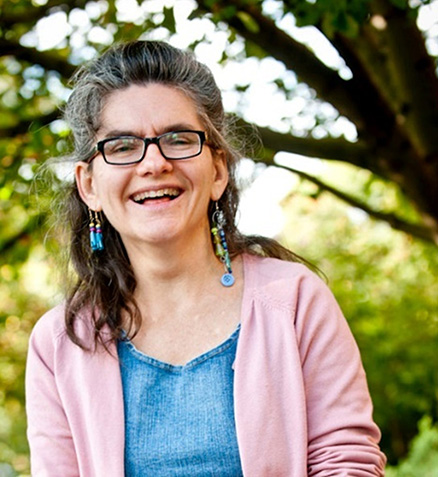 Dr. Holli-Anne Passmore, Concordia University of Edmonton
Dr. Holli-Anne Passmore, Concordia University of EdmontonSection Featured Speaker Address
June 14, 2025
Section on Environmental Psychology
Global environmental crises, climate breakdown, and plummeting biodiversity affect all of us. These threats to the finite planetary system that sustains all of life— human and non-human alike—strike at the very core of our existence and well-being. Eco-anxiety (or climate anxiety) is, understandably, on the rise, impacting the mental health of growing numbers of people. Indeed, a case can be made that eco-anxiety lurks beneath the surface in all of us as it spawns a cascade of fundamental existential anxieties relating to our basic human concerns with respect to identity, happiness, mortality, isolation, and meaning in life. This state-of-the-world clearly demonstrates how we, as humans, have become disconnected from the beyond-human natural world. At the same time, a large (and growing) body of empirical findings consistently evidences how connecting with nature contributes to psychological health and helps to provide meaning in our lives by addressing our need for coherence, significance/mattering, purpose, and relatedness. Indeed, some researchers have proposed that connecting with nature is a basic human need, the satisfaction of which is predictive of adaptive human feeling and functioning, and the thwarting of which can diminish well-being. To date, research examining the dynamics of the humannature relationship has largely been relegated to environmental, academic research areas of psychology. However, the inherent appeal that nature holds for us has important practical implications for applied psychologists (and their clients). This talk will provide an overview of the theories grounding work in this area and supportive research findings, while also introducing accessible, applied nature-based interventions to boost individual well-being and the well-being our planet.
Dr. Holli-Anne Passmore is an Associate Professor and Department Chair of Psychology at Concordia University of Edmonton (CUE) in Alberta, Canada. She is also Director of the multi-university Nature-Meaning in Life (NMIL) Research Lab, an Editor of the International Journal of Wellbeing, and Science Chair of the Spirituality and Meaning Division of the International Positive Psychology Association. She collaborates with
researchers around the globe primarily focusing on the development and validation of practical interventions to enhance well-being through noticing and engaging with everyday nature close to home. Within the meaning stream of her research, she examines pathways that lead to greater meaning in life, particularly among university students. Of course, these two research streams often overlap. Holli-Anne's academic research articles and book chapters have been published in numerous peer-reviewed journals and publications, and featured in various media and podcasts. She regularly presents her research findings at national and international conferences, as well
delivering keynote talks and workshops at local community-based organizations events. Holli-Anne is passionate about both her research and her teaching. She is known to friends, students, and colleagues simply as "H!A!", reflecting her general enthusiasm about life.
Promoting Healthy Families: Triple P and Circle of Security vs. Treatment as Usual – Evaluation Findings and Key Insights
 Dr. Andrea Gonzalez, McMaster University
Dr. Andrea Gonzalez, McMaster UniversitySection Featured Speaker Address
June 12, 2025
Section on Family Psychology
This presentation will delve into the comparative evaluation of two prominent parenting programs: Triple P (Positive Parenting Program) and Circle of Security Parenting (COSP). This research is situated within the domain of family and child psychology, focusing on interventions designed to enhance parenting practices and child outcomes.
The presentation will highlight findings from a randomized controlled trial in Ontario comparing Triple P and COSP to treatment as usual, involving 502 caregivers of children aged 2-6 years. Various parenting and child outcomes were examined, with families followed up for one-year post-intervention. Additionally, process evaluation findings will be presented, derived from focus groups with providers trained in the programs and one-on-one interviews with participating families.
Emerging themes include the differential impacts of these theoretical frameworks on parenting efficacy and child development. Key issues addressed will be the suitability of each program for diverse family contexts and the mechanisms through which they achieve their outcomes. Critical questions to be discussed include: Which program works best for whom? How may the underlying theories influence the effectiveness of the interventions? What are the practical implications for practitioners and policymakers aiming to promote healthy family environments?
Andrea Gonzalez is an Associate Professor in the Department of Psychiatry and Behavioural Neurosciences at McMaster University, with cross-appointments in the Department of Psychology, the Neuroscience Graduate Program, and the Department of Health Research Methods, Evidence, and Impact. She holds a Tier II Canada Research Chair in Family Health and Preventive Interventions. Dr. Gonzalez's research focuses on the developmental consequences of early life adversity, the impact of traumatic experiences on brain development and health, and the intergenerational transmission of risk. She is dedicated to developing and evaluating evidence-based preventive interventions to build stronger families and communities.
Weight is Not a Behaviour: Obesity Management in the Era of GLP1-Ras
 Dr. Michael Vallis, Dalhousie University
Dr. Michael Vallis, Dalhousie UniversitySection Featured Speaker Address
June 13, 2025
Section on Health Psychology and Behavioural Medicine
Psychologists have traditionally been asked to achieve weight loss through behaviour change, despite little evidence for sustained success. This has diminished the contribution of psychology to obesity. The revised model of obesity opens up psychological intervention to a more full scope of practice. This session will orient attendees to the potential of managing obesity as a chronic disease.
Dr. Vallis is a health psychologist based in Halifax, Canada. He is an Associate Professor in Family Medicine at Dalhousie University. He obtained his Ph.D. and M.A from the University of Western Ontario, London, and his B. Sc. From Dalhousie University. His main area of expertise is adult health psychology, with an emphasis on obesity, diabetes, cardiovascular risk, and gastroenterology. He spends most of his time training healthcare providers in behaviour change for chronic disease management. He regularly supervises clinical and academic students and is active in research on motivation, behavioural change, and adaptation to chronic disease. He consults nationally and internationally and is heavily involved in academic publications, journal editing, and clinical practice guidelines. He was on the executive of the Canadian Clinical Practice Guidelines for the Management of Obesity (2020) and lead author of the Psychological and Behavioural Chapter for these new guidelines as well as the 2006 guidelines. As well, he is an author of the Psychology and Mental Health chapter of Diabetes Canada's Clinical Practice Guidelines (2023, 2018, 2013, 2004). He received the distinguished service award from the Canadian Association of Bariatric Physicians and Surgeons, the 2021 Charles H Best award from Diabetes Canada, and holds a Queen's Diamond Jubilee Medal by the Government of Canada on the recommendation of Diabetes Canada.
What is psychology good for? Absolutely … everything … subjectivity excluded
 Dr. Thomas Teo, York University
Dr. Thomas Teo, York UniversitySection Featured Speaker Address
June 13, 2025
Section on History, Theory, and Qualitative Inquiry in Psychology (HTQ)
History shows that psychology has been a thriving discipline that began in the 19th century with few people in academia and developed into one of the most sought-after subjects at universities, permeating institutions, public and private life, not only in the western world but also in the Global South. Psychology has been promoted while having significant theoretical, methodological, and ethical limitations. Explanations for the expansion of psychology are presented, including participation in the “modernization” of society, collaboration with power, and collusion with neoliberal capitalism that benefits from turning the gaze to interiority. Despite the “successes”, the scientific goal of developing a theory of subjectivity is missing. Reasons such as the subdivision of mental life into minute parts, a highly successful research strategy in the natural sciences, and the institutionalized particularization of mental life for practical purposes, and their consequences are discussed. A framework for theorizing subjectivity is laid out, from the entanglement of the social, cultural, historical, with the relational and internal to focusing on possibilities rather than actualities. New ideas for theorizing subjectivity that address historical and contextual changes and the importance of drawing on a theory for understanding human mental life are advanced.
Thomas Teo is a professor of psychology in the Historical, Theoretical, and Critical Studies of Psychology Program at York University, Toronto, Canada. He has been active in the advancement of theoretical, critical, and historical psychology throughout his professional career. His research has been meta-psychological to provide a more reflexive understanding of the foundations, trajectories, and possibilities of human subjectivity. He is co-editor of the Review of General Psychology (Sage), editor of the Palgrave Studies in the Theory and History of Psychology, and co-editor of the Palgrave Studies in Indigenous Psychology. He is former president of the International Society for Theoretical Psychology, of the American Psychological Association's Society of Theoretical and Philosophical Psychology (Division 24), and former chair of the History and Philosophy of Psychology Section of the Canadian Psychological Association. He has research record with more than 200 academic publications and refereed conference presentations.
Methods of Weaving Reconciliation Promotion in Psychology Curriculum
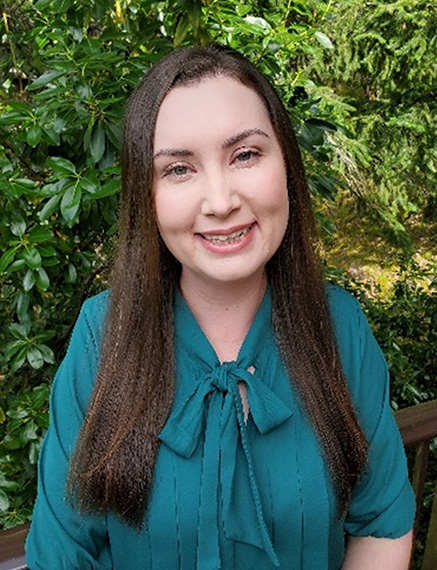 Dr. Natasha Wawrykow, University of Victoria
Dr. Natasha Wawrykow, University of VictoriaSection Featured Speaker Address
June 13, 2025
Section on Indigenous Peoples’ Psychology
Research indicates that many academics feel ill equipped to discussion concepts related to decolonization and reconciliation promotion because they have not received formal education on the subject and/or are not members of the Indigenous community. Recognizing the need to act on the recommendations made by the Truth and Reconciliation Commission, it is imperative that
reconciliation promotion is infused into psychology curriculum.
In 2023, the Canadian Psychological Association, Standards of Accreditation introduced a new foundational competency, Indigenous Interculturalism. This competency outlines education and training (e.g., Indigenous worldviews, values, and practices) required to work alongside and for Indigenous Peoples in the professional practice of psychology. This presentation will discuss elements of Indigenous Interculturalism, and methods of weaving reconciliation promotion in psychological curriculum to improve research collaboration and/or delivery of psychological service to First Nations, Métis, and Inuit populations in Canada. Teaching strategies such as land acknowledgment discussions, review of colonization examples that have and continue to impact Indigenous Peoples, and reconciliation promotion activities will be reviewed. Strategies will aid in the development of cultural literacy guidelines/direction for working alongside Indigenous Peoples of Canada.
Dr. Natasha Wawrykow is a member of the Skuppah Band in the Nlaka'pamux Nation. She is an Assistant Professor at the University of Victoria. She received her Ph.D. at the University of British Columbia in 2020.
Dr. Wawrykow strives to pursue collaborative Indigenous community-driven research topics and counselling opportunities that promote reconciliation and prosperity for the Indigenous community. Her research highlights Indigenous ways of healing and fostering self-worth, and contributes to culturally sensitive delivery of clinical service and conducting research. Her teaching focuses on the clinical training of graduate students and promotion of reconciliation between the field of psychology and Indigenous Peoples. Her undergraduate and graduate courses on reconciliation promotion have garnered national recognition and have been given the "Cool Course" distinction by Maclean's Magazine.
Working with Indigenous Peoples in different hospital, community, and university counselling clinics has affirmed Dr. Wawrykow's use of Narrative Therapy in her clinical practice. While the sharing of knowledge through storytelling has always been part of Indigenous Peoples' tradition, Dr. Wawrykow has learned that using narratives therapeutically aids in understanding how health can be experienced holistically for Indigenous Peoples and promotes strong, culturally appropriate therapeutic alliances.
Navigating the new normal: Work and family in the Covid-19 Aftermath
 Dr. Alyson Byrne, Memorial University of Newfoundland
Dr. Alyson Byrne, Memorial University of NewfoundlandSection Featured Speaker Address
June 13, 2025
Section on Industrial and Organizational Psychology
Background/Rationale: The COVID-19 pandemic underscored the importance of the work-family interface, raising questions on whether shifts in work practices promoted inclusivity or deepened inequalities.
Methods: This talk leverages empirical research from the presenter and other scholars, examining the impacts of remote work, caregiving demands, and gender expectations on work-family outcomes.
Results: Remote and hybrid work blurred the lines between professional and personal life, affecting work-family balance. Caregiving demands increased, disproportionately impacting working women, influencing short- and long-term outcomes.
Conclusions: The pandemic highlighted the complex interplay between work and family. By analyzing shifts in remote work, caregiving, and gender roles, this talk discusses challenges and opportunities in the post-pandemic landscape and suggests future research for organizations and work-family researchers.
Action/Impact: The findings indicate a need for organizations and families to reassess the work-family interplay, emphasizing the development of more inclusive and sustainable approaches to work and family.
Dr. Alyson Byrne is an associate professor in organizational behaviour and human resource management at the Faculty of Business Administration at Memorial University. She received her PhD in organizational behaviour from Queen's University in 2013. Prior to arriving at Memorial, Dr. Byrne also worked at the University of Manitoba and completed a post-doctoral fellowship on leader character at the Ian O. Ihnatowycz Institute for Leadership at the Ivey Business School at Western University.
Dr. Byrne's research interests lie primarily in leadership, gender, and work-family. She has been published in journals such as Organization Science, Journal of Management Studies, Harvard Business Review and The Leadership Quarterly. She has presented her research at numerous international conferences and has also been the keynote speaker for a number of public events concerning her research on leadership, gender, teams, and well-being.
Welcoming Newcomers Outside of Major Gateway Cities: Insights into the Challenges and Opportunities for Immigration and Multiculturalism in Newfoundland & Labrador
 Dr. Maggie Peyton, Office of Immigration and Multiculturalism
Dr. Maggie Peyton, Office of Immigration and MulticulturalismSection Featured Speaker Address
June 13, 2025
Section on International and Cross-Cultural Psychology
Canada’s so-called “gateway” cities of Montreal, Toronto and Vancouver are well-known destinations of choice for migrants of all backgrounds seeking to settle in Canada. However, recent years have seen a significant need to promote alternative destinations to better share the benefits of immigration to other regions of the country, and a number of innovative policies and programs have followed suit. Atlantic Canada has experienced unique challenges with attracting and retaining newcomers, however in spite of these challenges the region has diversified significantly in recent decades with substantial increases in the number of newcomers settling and remaining in the region. Newfoundland & Labrador is no exception. Despite the province’s history of resident outmigration, immigration to Newfoundland & Labrador is a critical driver of population growth. To ensure the province shares in the benefits of immigration and continue to consolidate multiculturalism, innovative approaches to promotion, settlement, and integration are necessary. This presentation highlights the unique aspect of immigration and multiculturalism in the province, drawing attention to the role of research and policy in adopting innovative approaches to diversity and inclusion in Newfoundland and Labrador.
Maggie Peyton is the Director of Immigration Policy and Settlement with the Office of Immigration and Multiculturalism, situated in the Government of Newfoundland and Labrador's Department of Immigration, Population Growth and Skills. She has held multiple of positions within the public and non-profit sector with areas focused on newcomer settlement and immigration, gender equity and healthy policy. Maggie holds a Bachelor and Masters of Arts from a Memorial University with a research background on the development of public policies for diverse populations. Maggie and her team have led the coordination of settlement supports for Ukrainians since March 2022.
Ageism as a Canadian Issue
 Dr. Susan Walsh, Office of Newfoundland Labrador Seniors’ Advocate
Dr. Susan Walsh, Office of Newfoundland Labrador Seniors’ AdvocateSection Featured Speaker Address
June 13, 2025
Section on Psychologists and Retirement
Ageism is a problem in Canada. The Advocate will address ways to minimize the damage done by it in society.
Susan Walsh, Seniors' Advocate Newfoundland and Labrador
Armed with a Bachelor of Social Work Degree, Susan began her career as a front line Social Worker in mental health. It didn't take long for her to realize that to really help people she needed to have an impact at the decision-making level. She obtained a Master of Social Work degree, specializing in policy, from the University of Toronto and spent 31 years in progressive leadership positions within numerous departments of the Newfoundland and Labrador provincial government focused on mental health, geriatrics, disabilities, child welfare, income support, Indigenous services, municipal affairs and executive council. Susan led a number of reform initiatives and served on various provincial and national boards, including both the Provincial and Territorial Deputy Ministers responsible for Social Services and Responsible for Seniors. Her most recent role, prior to her appointment as the Newfoundland and Labrador Seniors' Advocate in June of 2022, was Deputy Minister of the Department of Children, Seniors and Social Development.
After a 30-year career inside the "system", Susan finally realized the secret to creating real change and entered the world of advocacy! Susan has a unique perspective on the role of seniors' advocacy and how to achieve it.
Assessing and Addressing Insomnia: An Effective Approach for Clinical Practice
 Dr. Sheila Garland, Memorial University
Dr. Sheila Garland, Memorial UniversitySection Featured Speaker Address
June 12, 2025
Section on Psychologists in Hospitals and Health Centres
Sleep is a foundational health behaviour, and its disturbance is a feature of many psychological and medical disorders. It was previously thought that treating the primary disorder would resolve the secondary sleep disturbance. We now know that unmanaged insomnia is a significant predictor of the development of several mood and anxiety disorders, increases relapse rates after treatment, and has short- and long-term health consequences. Fortunately, psychologists are well equipped to assess and address insomnia and other sleep disorders. Cognitive-behavior therapy for insomnia (CBT-I) is a highly effective non-pharmacological intervention recommended as a first line treatment (APA, AASM, ACP). This multicomponent intervention integrates circadian science, behavioral principles of conditioned learning, and cognitive therapy to address the factors that maintain sleep difficulty. Strong evidence demonstrates that the treatment gains from CBT-I are significantly better maintained over time relative to hypnotic medication therapies. This presentation will briefly review etiology and pathophysiology, and provide practical direction for assessment and treatment of insomnia, with special consideration of clinical tips for interventions when insomnia is comorbid with other physical and psychological disorders.
Dr. Sheila Garland is a full professor in the departments of Psychology and Oncology at Memorial University in St. John's, Newfoundland and Labrador and a registered clinical psychologist. She completed her PhD at the University of Calgary, the Calgary Clinical Psychology Residency program, and completed a 3-year post-doctoral fellowship in behavioral sleep medicine and psycho-oncology at the University of Pennsylvania. Her research is focused on understanding the experience and testing interventions to improve insomnia and other symptoms in people diagnosed with cancer with a special emphasis on adolescents and young adults. She has published 135 peer reviewed research papers, nine book chapters, and regularly presents her research at national and international research meetings. She is a graduate fellow in randomized behavioral clinical trials from the National Institutes of Health in the USA and has led the design and conduct of five highly successful clinical trials of behavioural interventions for insomnia. Dr. Garland is currently Chair of the Health Psychology and Behavioral Medicine section of the CPA. She holds a 5-year Canadian Cancer Society Emerging Scholar Award to develop a mobile application for delivery of cognitive behavioral therapy for insomnia in cancer populations.
Psychology in the Military Feature Address: The Context of People Leaving the Canadian Armed Forces to Work in Correctional Services in Canada: The Prison as the Site of the Transition to Civilian life.
 Dr. Rosemary Ricciardelli, Memorial University
Dr. Rosemary Ricciardelli, Memorial UniversitySection Featured Speaker Address
June 12, 2025
Section on Psychology in the Military
In correctional services in Canada, samples across studies suggest upwards of 25% of correctional officers have former armed forces experience. The movement from military to public safety more generally is common in Canada, but research on the transition to publica safety at/in prison is understudied - with a small emerging literature out of the United Kingdom and now Canada. I draw on data from multiple studies, one being a survey of correctional workers in either federal correctional services or select provincial services. A second being a longitudinal study or correctional officers with military experience under the employ of Correctional Services Canada, where we collected interview, survey and MINI assessments to learn about their experience of the transition to civilian within the institution of prison. Given the complexity of prison society for those working and living, I start by showing how veteran versus non-veteran officers feel military experience prepared them for all elements of the job (i.e., security, custody, care, control, report writing). Then I talk about how military experience is thought to affect promotional opportunities at work. In addition, I remind of the dynamic of veteran prisoner versus veteran correctional officer when on the same unit or same prison, each time unique and requiring navigation. Considerations for health - are discussed.
Dr. Rosemary Ricciardelli is Professor (PhD) and Research Chair in Safety, Security, and Wellness, at Memorial University of Newfoundland. The winner of the 2023 International Corrections and Prison Association's Research Excellence Award, the 2023 Canadian Sociological Association's Angus Reid Applied Researcher Award, and the 2024 International Community Justice Association's President's Award, Ricciardelli was also elected to the Royal Society of Canada and is a fellow of the Canadian Academy of Health Sciences. Her research centers on evolving understandings of health, gender, and vulnerabilities within different facets of the public safety systems. Her interests lay in the social health, identity construction, and lived experiences of individuals. She leads a longitudinal study on the mental health and well-being experiences of correctional officers employed by Correctional Services Canada.
Adventures in Bayesian Meta-analysis: Applications and Pitfalls
 Dr. Jonathan Fawcett, Memorial University of Newfoundland
Dr. Jonathan Fawcett, Memorial University of NewfoundlandSection Featured Speaker Address
June 14, 2025
Section on Quantitative Methods
The volume of scientific literature has expanded exponentially in recent decades. With a broader and more diverse literature base than ever before in just about every subdiscipline, methods capable of providing principled syntheses of key findings have never been in higher demand. Meta-analysis remains the gold standard for synthesizing findings across studies with diverse outcomes. Concurrently, we have witnessed the rise of Bayesian approaches to estimation and hypothesis testing, providing robust ways to handle sparse data and integrate prior knowledge—advantages especially valuable to the intrepid meta-analyst. One area particularly well-suited to this approach is clinical epidemiology, where understanding the distribution of a disorder across different populations informs basic research and plays an important role in public health. In this talk, I describe lessons I have learned fitting meta-analytic models throughout my career, with an emphasis on epidemiological applications. I also highlight challenges (and a recent multivariate solution) related to estimating the prevalence of certain disorder categories (e.g., how many people in a typical sample have at least one anxiety disorder?). My hope is that these reflections will offer practical guidance for researchers aiming to produce rigorous, impactful syntheses in an era of abundant data.
Dr. Jonathan Fawcett is an Associate Professor of Cognitive Psychology at Memorial University of Newfoundland, with a special focus on memory control and an interest in quantitative methods. As the principal investigator of the NeuroFog Laboratory, Dr. Fawcett's research centers on understanding the mechanisms of controlling unwanted memories, blending his research expertise in cognitive and clinical psychology. He is regarded as a world expert on intentional forgetting and presently leads a consortium of 70 laboratories worldwide studying this topic. He also has a wealth of experience in meta-analytic methods, which he has applied most recently to estimating the prevalence of psychiatric disorders across a variety of populations. Dr. Fawcett's work has been published in top journals, spanning multiple disciplines, including Nature Human Behaviour, Nature Reviews Psychology, the Journal of Experimental Psychology: General, Psychological Medicine, the Journal of Psychiatric Research, and the Journal of Clinical Psychiatry.
Toto, I have a feeling we’re not in Toronto anymore: Lessons learned from working in Newfoundland and Labrador
 Dr. Janine Hubbard, NLHS
Dr. Janine Hubbard, NLHSSection Featured Speaker Address
June 12, 2025
Section on Rural and Northern Psychology
This invited talk will use humour and real-life examples to explore the unlikely career experiences for a psychologist based in St. John’s, NL, providing provincial services to clients living in rural, remote, and northern parts of Newfoundland and Labrador. Dr. Hubbard will discuss the transition from training in a major Canadian city to learning the culture, traditions, forms of connection, humility, challenges, and opportunities of a mostly rural province. Advice will be provided for potential trainees or those looking for an adventurous change in career location, as well as important lessons for those providing tele-health to rural and remote communities. Additional discussion will be invited from attendees working in other remote, rural, northern communities regarding ongoing challenges and opportunities working with clients in these communities.
Dr. Janine Hubbard is a Registered Psychologist based in St. John's Newfoundland. She completed her graduate training in Clinical Developmental Psychology at York University, and her clinical residency at the IWK Hospital in Halifax. She moved to St. John's in 2003 and since that time has worked in the health care system, as well as a private practice and graduate teaching in the PsyD program at Memorial University of Newfoundland and Labrador (MUN). Dr. Hubbard has been actively involved in Psychology provincially and nationally through her involvement with the fraternal psychology association (APNL) and the regulatory board (NLPB) and nationally with Canadian Psychological Association (CPA). She provides frequent interviews to local and national media on a variety of psychology-related topics including a weekly segment "Get Psyched with Dr. Janine" on the local evening tv news. Working within the provincial health care system she has a provincial mandate meaning she sees patients from all over NL including some from very rural, remote, and northern communities and previously visited Labrador to offer "traveling clinics".
Forging the Path: The Past, Present, and Future of the Sexual Orientation & Gender Identity Section of CPA
 Dr. Todd Morrison, University of Saskatchewan
Dr. Todd Morrison, University of SaskatchewanSection Featured Speaker Address
June 12, 2025
Section on Sexual Orientation and Gender Identity
This discussion will bring together three generations of Sexual Orientation and Gender Identity Issues (SOGII) chairs to share their unique perspectives on the section’s past, present, and future. Dr. Todd G. Morrison, the founder of SOGII, will discuss its origins and provide background on why this section was needed. Dr. Morrison will also share the original goals of SOGII and his perceptions of whether or not these goals can be realized. Dr. Karen Blair, the longstanding and outgoing chair of SOGII, will discuss the changes within SOGII over the past decade, the section’s broader impact on LGBTQ+ policies in CPA and Canada, the impact of the pandemic, and the challenges that continue to face the section. Dr. Blair will pay particular attention to the section’s progress in disseminating its members’ research across other sections of CPA, culminating in the question of what purpose SOGII should serve today and in the future. The incoming chair and chair-elect for SOGII, will share a vision for the future of the section and articulate how it will build on the myriad contributions made by all former chairs of SOGII.
Todd G Morrison is a Professor at the Department of Psychology, University of Saskatchewan. He conducts research in human sexuality, gay and lesbian issues, psychometrics, body image, and stereotyping, prejudice, and discrimination.
Psychological Gaps in Health Decision-Making: How Metaphors and Reasoning Styles Can Spur Suboptimal Health Decisions
 Dr. David Hauser, Queen’s University
Dr. David Hauser, Queen’s UniversitySection Featured Speaker Address
June 14, 2025
Section on Social and Personality Psychology
How can we help people make better health decisions? In this talk, I illustrate psychological gaps in popular health decision-making recommendations. One recommendation for health messaging encourages "fighting" metaphoric frames for cancer, suggesting that such metaphors motivate people to make better health decisions. I will present three studies wherein participants read health information that metaphorically framed cancer with "fighting" language or with alternative language. Then, participants beliefs about cancer prevention were assessed. Those reading "fighting" metaphors were more fatalistic about getting cancer and had less accessibility of and intention to engage in certain cancer prevention behaviours. Thus, such metaphors may promote suboptimal health beliefs. Another recommendation for health decision-making suggests that providing the public with more information improves health decisions. However, vaccine resistors claim their beliefs are founded upon ample information search. I will present two studies that measured vaccine resistance and information search tendencies. Results indicated that, despite their claims, vaccine resistors consult less evidence before reaching conclusions. Thus, more information may not be sufficient for improving health decisions because some people make decisions without consulting much evidence.
Dave Hauser is an Associate Professor of Social/Personality Psychology at Queen's University in Kingston, Ontario. His research examines the interplay of judgment/social cognition and language, with recent work focusing upon health decision-making. His research has been funded by the Natural Sciences and Engineering Research Council of Canada and the Social Sciences and Humanities Research Council of Canada. He has been awarded a "Rising Star" (Early Career) Award by the Association of Psychological Science.
Sport and Exercise Psychology: Research to-and-from Practice
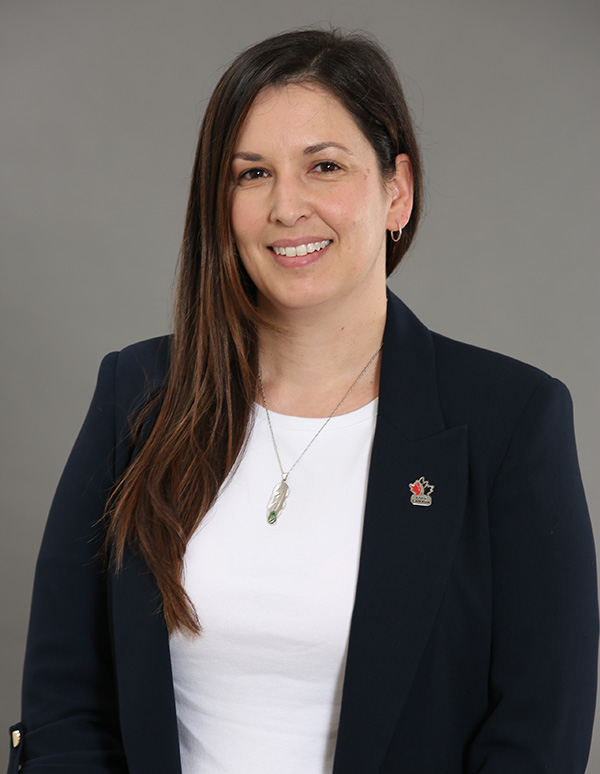 Dr. Lori Dithurbide, School of Health & Human Performance, Dalhousie University
Dr. Lori Dithurbide, School of Health & Human Performance, Dalhousie UniversitySection Featured Speaker Address
June 13, 2025
Section on Sport and Exercise Psychology
Dr. Dithurbide will be discussing her research in trust in technology and in sport groups along with her research in athlete and coach wellbeing. More specifically, Dr. Dithurbide will be presenting on how human-technology interactions may impact skill acquisition, coaching, training, and athlete performance. Further, Dr. Dithurbide will discuss her experiences as a Certified Mental Performance Consultant (CMPC) and how that has influenced her line of research into athlete and coach wellbeing. This line of inquiry includes research on athlete mental health and wellbeing over the course of the Olympic Games postponement due to the pandemic, coach and staff wellbeing post-Olympic Games, the mental wellbeing of community sport coaches, and looking forward towards research in evaluating the national mental health strategy of national team athletes. Her experience as both a researcher and applied practitioner (CMPC), have mutually influenced her work in both domains. Lastly, Dr. Dithurbide will discuss her experience as a CMPC in collaborating in the support of athletes and coaches with Registered Psychologist and other physical and mental health practitioners.
Dr. Dithurbide's research is focused on the psychosocial aspects of sport and performance. The central themes of her research examine 1) the interactions between humans (athletes and coaches) and technology, both in training and competition; 2) athlete and coach wellbeing; and 3) group dynamics in sport and performance contexts. Results of her research help inform technology users how to best incorporate and interact with technology and its impact on outcomes such as learning, confidence, and performance. Dr. Dithurbide is also Certified Mental Performance Consultant with the Association of Applied Sport Psychology and the Canadian Sport Psychology Association, and holds the High-Performance Certification (Mental Performance) with Sport Scientist Canada. She has supported Canadian athletes over many sports, most recently at the 2024 Paris Olympic Games. Lori will share her years of experience as both a sport psychology researcher and applied practice as a Certified Mental Performance Consultant.
Making Wrong Turns and Learning to Navigate Academia
 Dr. Sheila Garland, Memorial University
Dr. Sheila Garland, Memorial UniversitySection Featured Speaker Address
June 14, 2025
Section on Students in Psychology
This presentation will explore the inevitable missteps and detours encountered during academic journeys and how these moments of uncertainty can lead to valuable growth and insight. It will highlight the challenges that many face, from choosing the wrong research path to struggling with academic identity and emphasizes that these "wrong turns" are not failures but essential learning experiences. Attendees will gain practical strategies for navigating the complexities of academia, including Embracing setbacks as part of the learning process; Reframing mistakes as opportunities for growth; Developing resilience and adaptability in the face of unexpected challenges; Cultivating a supportive academic community and seeking mentorship; and Finding the right balance between persistence and flexibility. By the end of the session, participants will have a deeper understanding of how to overcome academic obstacles and build a more fulfilling and successful career, no matter where the road leads.
Dr. Sheila Garland is a full professor in the departments of Psychology and Oncology at Memorial University in St. John's, Newfoundland and Labrador and a registered clinical psychologist. She completed her PhD at the University of Calgary, the Calgary Clinical Psychology Residency program, and a 3-year post-doctoral fellowship in behavioral sleep medicine and psycho-oncology at the University of Pennsylvania. Her research is focused on understanding the experience and testing interventions to improve insomnia and other symptoms in people diagnosed with cancer with a special emphasis on adolescents and young adults. She has published 135 peer reviewed research papers, nine book chapters, and regularly presents her research at national and international research meetings. She is a graduate fellow in randomized behavioral clinical trials from the National Institutes of Health in the USA and has led the design and conduct of five very successful clinical trials of behavioural interventions for insomnia. Dr. Garland is currently the Chair of the Health Psychology and Behavioral Medicine section of the CPA. She currently the Director of Clinical training for Memorial University's Doctor of Psychology (PsyD) program.
Navigating Generative AI in Higher Education: An Integrative Approach

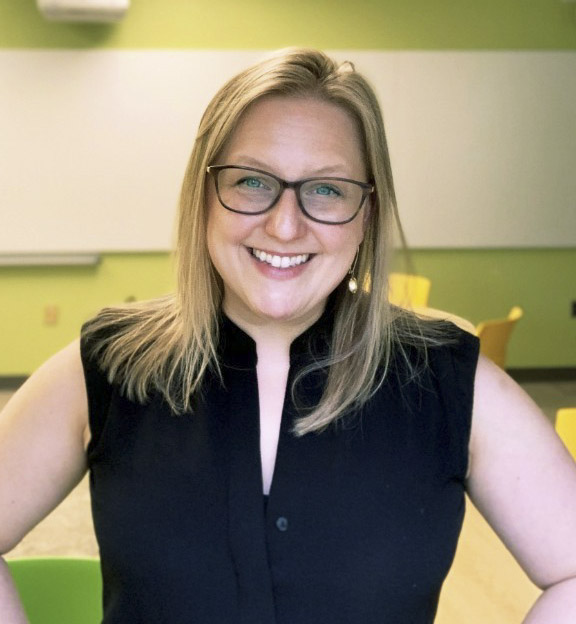
Dr. Devin Fowlie, Queens University
and
Dr. Meghan Norris, Queens University
Section Featured Speaker Address
June 13, 2025
Section on Teaching of Psychology
The increasing prevalence and near ubiquity of generative artificial intelligence is beginning to transform higher education, presenting both opportunities and challenges. In many respects this technology is not new, and neither are the conversations about new technologies in the classroom. This session will explore how generative AI can enhance personalized learning and streamline teaching while considering the implications for academic integrity, ethical use, and intellectual property.
We will explore and discuss strategies for leveraging AI to provide adaptive feedback that supports diverse learner needs, ethical considerations of AI-generated content, and pedagogical shifts necessary to address cognitive offloading and student reliance on AI tools. These issues will only grow in prominence as AI becomes integrated into the classroom.
Participants will engage with their personal and professional experiences as educators, learners, and users of AI, reflecting on and integrating these experiences with pedagogical best practices to bring new insights to the conversation.
Dr. Devin Fowlie holds a PhD in Social/Personality Psychology and is an expert in attitudes, social cognition, and psychological measurement. His research bridges experimental and applied approaches, exploring how individual differences and contextual factors shape behavior. His current work focuses on leveraging artificial intelligence to improve the prediction of human behavior. Dr. Fowlie integrates insights from applied research into his teaching, leading innovations in curriculum design with a focus on accessibility, learning outcomes, and the critical implications of artificial intelligence in post-secondary education.
Dr. Meghan Norris is an Associate Professor and Chair of Undergraduate Studies in the Psychology Department at Queens University. She holds a PhD in Social/Personality Psychology from Queen's University with expertise in the fields of measurement, attitudes, and attitude change. Dr. Norris is passionate about open-access and she has edited several open-access books on higher education and careers in psychology. Additionally, Dr. Norris is involved with the CPA's Education and Training Committee, and was recently a contributor to a CPA briefing paper called "Artificial Intelligence and Psychology".
Mental Health and Wellbeing Impacts of the COVID-19 Pandemic on Canadian Healthcare Workers and Public Safety Personnel: Leveraging Lessons Learned
 Dr. Margaret McKinnon, Department of Psychiatry and Behavioural Neurosciences, McMaster UniversitySection Featured Speaker Address
Dr. Margaret McKinnon, Department of Psychiatry and Behavioural Neurosciences, McMaster UniversitySection Featured Speaker AddressJune 12, 2025
Section on Traumatic Stress
The COVID-19 pandemic has exacerbated further mental health and wellbeing concerns among Canadian healthcare workers and public safety personnel (PSP). Our research suggests that moral injury and perceived lack of organizational support has contributed to post-traumatic stress injuries among Canadian healthcare workers and PSP. Preliminary evidence suggests that increased organizational support may decrease these injuries. In response to these findings, we have mounted a suite of online mental and well being resources to support the psychological needs of Canadians during emergencies and disasters, including future pandemics. In addition, we have developed trauma-informed organizational guidelines intended to reduce psychological distress during these events. Although devastating, the COVID-19 pandemic has reinforced strongly the need for emergency preparedness before, during, and after events that affect population health. Psychology has a critical role to play in these preparedness efforts.
Dr. Margaret McKinnon is Professor and Associate Chair, Research in the Department of Psychiatry and Behavioural Neuroscience at McMaster University where she serves as the Homewood Chair in Mental Health and Trauma in the Department of Psychiatry and Behavioural Neurosciences. A clinician-scientist, Dr. McKinnon is also appointed as the Research Lead for Mental Health and Addictions at St. Joseph's Healthcare Hamilton and a Senior Scientist at Homewood Research Institute. Dr. McKinnon is known for her work characterizing trauma-related illness and PTSD among military members, Veterans, public safety personnel, and survivors of childhood abuse and trauma. She is also involved in the development and testing of novel treatment interventions aimed at often-unexplored aspects of PTSD and trauma, including guilt and shame, moral injury, dissociation, and cognitive dysfunction. Dr. McKinnon served as the Chair of the federally funded PTSD Centre of Excellence's Research Reference group and works closely with government sectors, including Veterans Affairs Canada and the Canadian Armed Forces. Dr. McKinnon has published nearly 190 peer-reviewed papers and chapters and holds funding from numerous federal and provincial bodies, including the Public Health Agency of Canada, the Canadian Institutes of Health Research, the Canadian Institute of Military and Veterans Health Research, National Defence, Veterans Affairs Canada and the Worker's Safety Insurance Board of Ontario. Her laboratory is also grateful for the support of generous donors, including True Patriot Love, the FDC Foundation, the AllOne Foundation, Homewood Health, the Military Casualty Support Foundation, and the Cowan Foundation.
Balancing Research, Teaching, Service and Life as a Teacher-Scholar
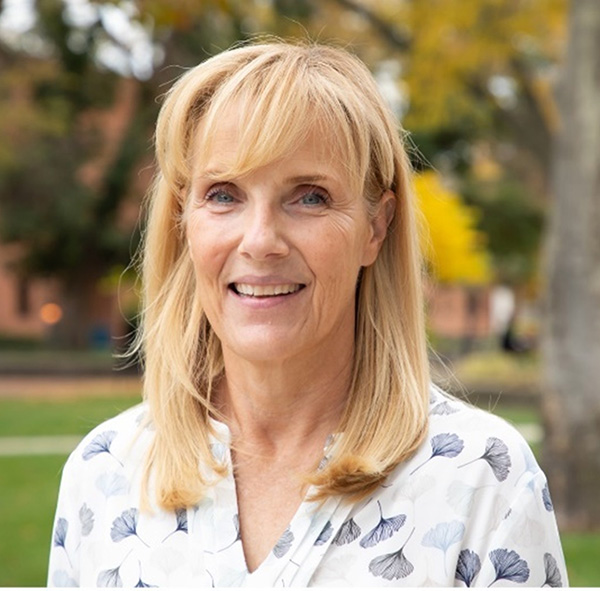 Dr. Pam McAuslan, University of Michigan-Dearborn
Dr. Pam McAuslan, University of Michigan-DearbornSection Featured Speaker Address
June 13, 2025
Section on Women and Psychology (SWAP)
The focus of this presentation broadly is on improving and promoting health, but my approach will be non-traditional. My academic career isn’t what I’d imagined when I was an aspiring graduate student. I had many publications coming out of grad school and was expected to seek out a job at a big research university. Instead, I took a job as an Assistant Professor at the University of Michigan-Dearborn (3-3 load, lots of service, no TAs or doctoral students). I love teaching and this worked for my family. But it made being a prolific researcher a challenge. I’d like to share some of the lessons I’ve learned about creating a healthy balance and the strategies that I used to make research work in this kind of setting. I’ll also focus on my primary research interests which involve using the media practice model to better understand how early life experiences and individual characteristics influence how young people use media (this includes the media they consume, how they identify with media personalities, and how media makes them feel) and how these factors subsequently influence attitudes and behaviors related to interpersonal violence. This research is meaningful because it has implications for early intervention (e.g., promoting critical thinking and media literacy to make young people more resilient to intolerant attitudes related to gender and sexuality).
Pam McAuslan is a Professor of Psychology at the University of Michigan-Dearborn. In addition to teaching undergraduate and graduate classes in Social Psychology, Interpersonal Relationships, Gender, and Statistics, she has served in various roles in her 26 years at UM-Dearborn including as Chair of the Institutional Review Board, Director of the MS Psychology Graduate Programs, and Psychology Discipline Chair. Her primary research interests focus on factors related to interpersonal violence, particularly how the media practice model can be used to help us to understand how early lived experiences and individual characteristics influence media use (consumption, identification, and influence) and how these factors subsequently impact attitudes and behaviors related to violence. But her expertise in methods and statistics have led her to collaborations with colleagues across psychology and she has publications on diverse topics including substance use, parenting self-efficacy, mindfulness, self-promotion, and trust in autonomous vehicles.
